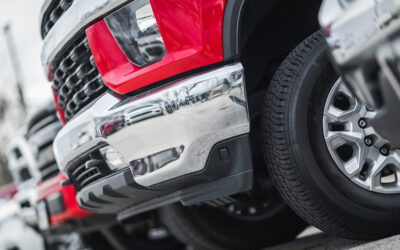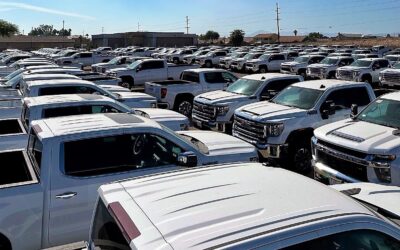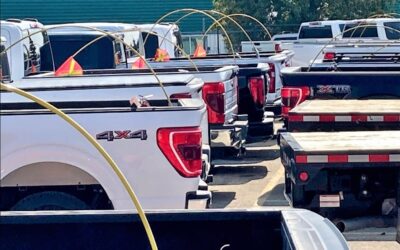Diesel Vs Gas: Which is Most Popular Among Commercial Fleets?
With stricter emissions and EPA requirements that have been implemented over time, the debate of diesel vs. gas powered fleets is heating up among fleet managers. However, just as with many other debates in the commercial truck industry, there is not a single cut and dried answer.
There are several reasons for this, and most depend on your individual needs. Other factors depend on whether you are buying, leasing, or renting vehicles. Leases and rentals will solve some issues. For instance, clearly if you’re renting your fleet, expected life cycle and some repair and maintenance costs will not be a factor.
Which brings us to another point: how you manage your fleet, and the mix of ownership, leases, and rentals will also determine whether diesel or gas is a better choice for you. Or whether, like many fleet managers, you may have a mix of the two types of vehicles depending on your company needs.
Let’s take a look at a few of the things to consider, how they are affected by fleet management methods, and what your company actually does with the vehicles themselves.
Initial Vehicle Costs
One of the biggest concerns if you are buying or leasing vehicles is initial cost. This also affects rental costs as well. The higher the cost of the vehicle, the more the rental company will charge you to use it, and typically diesel rentals cost more than their gas counterparts. So what is the initial cost difference anyway?
Depending on the class and manufacturer, the cost of the diesel option is usually $7,000e to $10,000 more than the gas option for the same truck, which in many cases makes the gas option more desirable. However, there is a flip side to this – one we will explore shortly in more detail.
Often diesel engines get better fuel economy (depending on the situation), they last longer, and they are more durable in many applications. These things alone will often offset the initial cost of the diesel engine options.
However, in some cases this also depends on the configuration of the vehicle, whether it is a cabover, a van style vehicle, or more of a panel van. Fuel economy may be vastly different, and we will talk about that in detail in a few moments.
This is another argument in favor of renting your fleet, at least initially. You can try different vehicles in various configurations to determine what will actually work best for your company and fleet needs. Testing these things in the real world is the best way to truly determine what will work best with your needs.
Projected Annual Miles
This is one of the largest keys to the cost of operating a vehicle on a number of levels and is a huge part of the gas vs. diesel debate. There are several factors to consider, and they all add up to different advantages and disadvantages which are not directly related to cost, but relate to dependability and longevity.
As a general rule, if you are using your vehicle for mileage lower than 25,000 a year, gas may be a better choice. This mileage is well within the range for a gas vehicle without dramatically increasing the maintenance requirements, and the fuel will cost less initially even if the gas mileage is lower.
However, think of it this way as well. If you are getting ¾ -ton pickup trucks, note that the cost of the truck is about $8,000 more for the diesel than the gas option. The diesel will save you about 30% in fuel economy, but the same amount of fuel will cost you more initially, by around $5,000 to $8,000 depending on current fuel prices and where you operate the vehicle most of the time.
Will the amount of driving you do cover the extra cost of the fuel and the engine initially? To determine this, you will need to do some simple mathematics. Here is an example, using the ¾ ton pickup truck.
First, it is important to understand the difference between light and heavy-duty trucks. Many ¾ ton trucks are divided this way. Even though they can technically handle the same loads, diesels are considered heavy duty and are often heavier as they are equipped with more robust, and thus heavier frames, hitches, and even the extra weight of the motor.
It is therefore important to understand what you will be using the truck for and making sure you are comparing apples to apples so to speak. Trucks with similar features, towing packages, and more might not be available in gas options, and you will first have to determine if that truck will meet your needs for those miles.
This might mean that fuel economy differences are smaller than you might think (more on that in a moment), but by the time you factor in insurance and other costs, the cost per mile for operating a diesel may be just as high as that of a gasoline engine, or the difference may be so insignificant they won’t pay for differences in cost.
Generally, cost in operations per mile is about 8% higher for gas than diesel. So for a Dodge 2500 Heavy Duty, the gas version gets 13 mpg, and the diesel 16 mpg (average). The cost of a similarly equipped truck is $36,170 for gas vs. $44,700 for diesel, a difference of 15% in miles per gallon, but 24% in initial cost. This leads us to another important factor: life cycle of the vehicle.
Expected Life Cycle
The next big question is how long you expect to keep the vehicle for use in your company. In the example above, if you kept the truck for at least two years and everything else was equal, the diesel would pay for itself, or at least break even with the gas option.
The issue is that things seldom remain equal. Fuel costs change, repairs come along, or the needs of the fleet change. It is helpful at this point to create a spreadsheet, one that will do some calculations for you, and plug in numbers to see what the results might be.
Here are some things to consider carefully, and some assumptions to compile:
- Annual Miles: How far will the vehicle be driven every year? This can be taken from the section above, and to be accurate round the numbers up for a possible worst-case scenario.
- Average Fuel Economy: (Again, we will talk about this in detail in a moment). Just be sure to remember that published fuel economies are averages. Press your sales rep for more real-world examples and talk to others in your industry running similar platforms to try to get real world numbers.
- Length of Ownership: Generally, the longer you use a vehicle, the more the advantage trends toward diesel. Be realistic with yourself about how long you will use the vehicle, and how often you will replace your fleet.
- Initial Cost: This is the cost of the vehicle at the start.
To plug in some numbers, say you were to drive the truck only 15,000 miles a year with the gas engine getting 13 mpg, the diesel 16. We estimate that diesel fuel will average $3.40 a gallon, and gas will be $3.15. The expected service life is 60 months. Once you also add that the diesel costs around $8,000 more, you get the numbers that the diesel option will actually cost you more over the 60-month lifespan.
In order to recoup your costs, you will either need to operate the vehicle more miles during the year or extend the life cycle to somewhere around 90 months.
This example relates to purchases but can also be applied to leases and rentals. Lease payments may be more affordable, but life cycles may be shorter, causing the numbers to fluctuate. Rental costs must therefore be analyzed looking at fuel and other costs to determine if they are less expensive than ownership.
Fuel Economy
There have been significant advances to gas motors, thus the difference in fuel economy between the two types of industrial trucks is perhaps smaller than you might imagine. Turbocharging, multi-cylinder controls, direct injection, and other advantages make operating gas engines more affordable. The differences come in how you use your vehicles.
Remember, fuel economy is often based on a best-case scenario. Trucks are unloaded and operated at fairly constant speeds under ideal conditions. It is unlikely you use your vehicles that way. In fact, if you tow trailers with any regularity, the disparity between gas and diesel can be even wider.
For example, in the ¾ ton pickup above, the Dodge 2500 may get 13 mpg for the gas model, and 15 for the diesel under ideal conditions. But add a trailer with a small bobcat, and the difference could be much wider. The gas motor will be working much harder, and mileage can drop to 9 mpg or even lower.
The diesel on the other hand, especially if it is equipped with a turbo, may still sip along at 14-15 mpg – not stellar numbers, but better than the gas model by almost 30%. There are other things to consider as well.
This is why we mentioned above that published fuel economy numbers are averages and should only be taken at face value and as a best-case scenario. Your actual results may vary, and there are a number of ways to get more accurate estimates.
- Online Reviews: Reviews posted by actual customers will often contain real numbers they have experienced themselves under different conditions. They are often much closer to the numbers you might experience.
- Forums: Of course, there are online truck forums everywhere from Reddit to other hosted forums where owners talk trucks and ask questions. Get involved and see what others offer for advice and experience.
- Social Media: Ah, social media. There is a lot of information out there in groups and on pages where you can determine if the hype of the trucks you are looking at actually hold up under fleet use.
- Ask Others: The likelihood is that you know others in your industry who also have fleet vehicles. Ask them what they are doing, and what their cost results are. You could even contact their fleet manager and try to get all the information you can.
Remember, to be effective as a fleet manager and make the right decisions, you need as much information as possible.
Maintenance Costs
This hails back to what we have mentioned before, but this is a factor in what it will cost to operate a fleet vehicle and is a part of the cost per mile of operations. The cost of major repairs, not regular maintenance costs are often the factor that drives a business towards rentals instead of ownership.
These costs can be broken down into a few categories, and then once added together, they can be divided out to figure out your cost per mile of operations. Here they are in their simplest forms.
Oil Changes
Every vehicle needs these, and if you change your oil every 5,000 miles in a diesel and 3,000 miles in a gas vehicle, you will make between 4 and 8 changes a year. Gas oil changes are cheaper than diesel ones, around $20-$40 each compared to $50-$70 for diesel depending on where you go.
Repair Costs
When something does go wrong, what does it cost to fix it? If your vehicle is outside of warranty or has a limited one because it is a commercial vehicle, this can be a large burden. Heavy Duty trucks tend to come with greater costs for parts and labor in everything from brakes to engine parts to electrical systems.
These are costs that must be added to the operations per mile cost of a vehicle.
Fuel
Note that at almost every turn, under every category, we mention fuel. Fuel and fuel costs are one of the most common complaints about commercial vehicles, and certain repairs do help with economy and consumption issues. These are also a part of maintenance.
Tires and Wheels
Tires are expensive, and they need to be replaced on commercial vehicles more often than passenger cars. They are generally more expensive as well and spending a couple of thousand on a set of tires is not uncommon. This of course does not account for flats and other issues between complete tire replacement sets.
Once you add all of these up, and enter them in your spreadsheet, it will help you get a figure on what maintenance will really cost.
Rental companies buy new tires a regular mileage intervals, making it unlikely that you will have to replace them although minor repairs, rotations, and other maintenance will be your responsibility. It can factor in to how much it costs to rent vehicles as well, so be aware of these when figuring your cost per mile with different options.
Trailer Needs
Here is the deciding factor for many fleets. As we mentioned when talking about fuel economy, it is vital to understand the effect pulling a trailer has on any vehicle. In our ¾ ton example, not only does fuel economy suffer, but depending on the weight of the trailer, it can increase other costs as well, be harder on the transmission, and even increase tire wear and more.
The more often you need to pull a trailer and the heavier the trailer is, the more your decision will lean toward diesel over gas. These engines are more powerful, transmissions are generally more capable, and economy is better.
However, if you are only using small trailers from time to time, gas might still be a viable option for you.
Equipment Needs
Do you need a PTO? A fifth wheel hitch that has a certain capacity? What other specific needs do you have related to the truck you are using? The more of these specific needs, the more you can narrow your choices. For instance, if you need a PTO, in most cases the gas option will not have one of these available.
The heavier duty you need the truck to be, the more specific equipment you need, the easier it is for you to narrow your choices. Generally speaking a diesel is tougher, stronger, and more fuel efficient when it comes to adding additional equipment. It is often worth the additional initial cost to have this capability.
Remember that rental truck options are often a good choice in these cases if you don’t know for sure what you will need in the long run. An initial trial of one truck or another can make it easy to make the transition if your needs change.
There are other factors to the gas vs. diesel debate. The answer as to which one is right for you, depends on your business and what you plan to do with these vehicles.
While it once was true that diesel far outnumbered gas motors for industrial applications, many fleet managers have found that gas works better for them and is actually less costly in the long run. Use these ideas as a guide to help you determine what fuel type is best for you and your fleet.
Sources:
https://deepblue.lib.umich.edu/bitstream/handle/2027.42/111893/103193.pdf
https://www.government-fleet.com/156355/gas-vs-diesel-the-bad-investment-only-fleet-managers-know-about
https://www.carsdirect.com/car-repair/basics-of-diesel-oil-change






